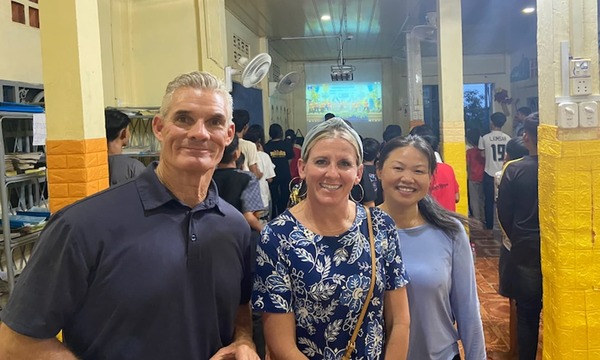In their new book, Winsome Persuasion, Biola University professors Timothy Muehlhoff and Rick Langer ask what Christians’ interactions with the dominant cultural ethos should look like. How might Christians be persuasive and civil at the same time? How should Christians respond to those who ridicule and caricature them? How can Christians challenge the beliefs of other communities with love and respect?
Muehlhoff, who teaches communication studies, and Langer, who teaches biblical and theological studies and is the director of the office for the integration of faith and learning, present a compelling vision of public engagement aimed to be shrewd and gracious.
Here, Muehlhoff and Langer share the why behind their book and a preview of the content within Winsome Persuasion.
Why did you decide to coauthor Winsome Persuasion?
Richard Langer: I wanted to write the book because I had a strong feeling that the Christian voice was not being heard in public discourse — not so much because we weren’t speaking, but because we were speaking in ways that kept others from really hearing what we were trying to say.
Why is public discourse such a hot-button issue for Christians?
Tim Muehlhoff: To separate, or engage? How should Christians respond to a culture steadily moving away from a biblical worldview? Biblical views concerning sexuality, abortion, marriage, and God are abandoned in favor of an accommodative stance that often intolerantly attacks, belittles, and ultimately silences opposing views. When president and chief operating officer of Chick-fil-A Dan Cathy answered “guilty as charged” when asked if he supported traditional marriage, he was publicly attacked and Chick-fil-A stores were defaced with “Tastes like HATE!” graffiti. As the minority, how can Christians engage those holding the dominant perspective in a way that is winsome, civil, and persuasive? Communication theorists call a group arguing for the minority view a counterpublic.
Why are so many people afraid of public discourse?
Muehlhoff: Rather than engaging in the vitriolic communication climate aptly labeled the argument culture by rhetoricians, many Christians have adopted the attitude, “To stay silent is to be safe!” Or, better silent than sorry. Better to keep unpopular views private than to risk ridicule or hostile opposition. But what if you and your community want to engage? “Starting a quarrel,” suggests an ancient Proverb writer, “is like breaching a dam; so drop the matter before a dispute breaks out” (Prov. 17:4). Winsome Persuasion explores how we can avoid quarrels with others as we seek to advance a position increasingly seen by many as unpopular and in the minority.
How does this book contribute to the discussion of and engagement in public discourse?
Muehlhoff: The uniqueness of Winsome Persuasion is that it helps readers prepare to engage by laying the theoretical foundation for understanding what constitutes a counterpublic, discovering the rhetorical and philosophical tools necessary for engagement, and wrestling with issues specific to Christian counterpublics. In addition to the structure of the book, the following features make the book unique:
1. Each chapter introduces readers to key principles found in communication theory such as cognitive complexity, the rule of reciprocation, constitutive rules, fundamental attribution error, and agenda anxiety. However, each of these ideas is presented in an accessible style.
2. Biographical sketches will accompany select chapters to illustrate how key principles have been executed by historical figures. For example, as readers consider the need to form coalitions with non-Christian counterpublics to tackle common concerns (chapter 8), they’ll consider how William Wilberforce forged relationships with others to end the slave trade in Britain.
3. For years we have co-taught a course helping students learn to be counterpublics. Not only are students introduced to the concept of being counterpublics, but they are also required to select a cause and be an advocate during the semester. Winsome Persuasion will contain examples — both successes and failures — of what these students learned as they took theory and applied it to real-life community issues.
Why do you personally think the topic of public engagement is so important?
Langer: I am the director of the Office of Faith and Learning at Biola, so my daily concern is attempting to make connections between the historic Christian faith and the best of human learning. This book is an example of such attempts because it uses the best of human learning concerning communication and brings it into conversation with the message and implications of the Gospel. It is also close to my heart because it thoughtfully engages the practice of Christians through the ages and makes explicit use of their examples in guiding our behavior today. In other words, it helps us see that our struggles with contemporary culture are part of the baton that has been passed to us by those who have run the race before. We can and should learn from their examples. I also was a pastor for twenty years before becoming a professor, and I believe there is a huge felt need in the church for winsomely engaging a prevailing culture that has a disregard or even a disdain for the Christian church.
Purchase the Winsome Persuasion online and at local book retailers.
For more information, contact Jenna Loumagne, manager of media relations, at (562) 777-4061 or jenna.loumagne@biola.edu.
 Biola University
Biola University
_(1).jpeg)
.jpg)